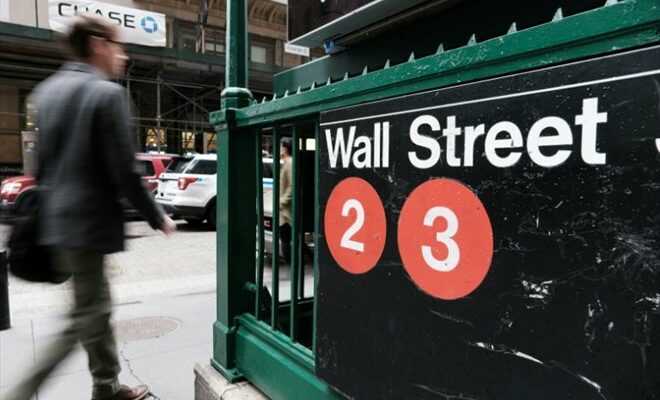The Wall Street subway station in New York (GETTY IMAGES NORTH AMERICA/AFP/SPENCER PLATT)
The New York Stock Exchange fell again on Wednesday, uncomfortable with a higher than expected inflation indicator, which opens the door to an even more marked tightening of US monetary policy.
The Dow Jones dropped 1.02% and the broader S&P 500 index 1.65%, but it was above all the Nasdaq index which was heckled, yielding 3.18%.
Since its peak at the end of November, the barometer of technology stocks has melted by almost 30%.
The entire session was marked by the publication, before the opening of Wall Street, of the CPI consumer price index, which came out at 8.3% in April, down from 8.5% in March. but more than the 8.1% expected by economists.
During the first half of the day, the indices went on a roller coaster, marking the opposition of two visions of the indicator.
On the one hand, a positive reading. Cliff Hodge, of Cornerstone Wealth concluding that “March will have been a peak” for inflation, which has begun “a slight deceleration”.
“The fears of recession are exaggerated”, continued the analyst, for whom “the consumer remains solid and continues to spend”.
The other part of the operators saw in this publication an alarming signal.
“Underlying inflation (excluding energy and food) has reached its fastest pace since January,” reacted Charlie Ripley, of Allianz Investment Management, for whom this “makes the job” of the American central bank (Fed ) “more delicate”.
“This persistent inflation will push the Fed to (raise rates) more aggressively,” anticipated Will Compernolle of FHN Financial.
“It could even lead some (members of the Fed) to argue for a 0.75 percentage point hike in June,” he said, a prospect that had been dismissed by Fed Chairman Jerome Powell. last week.
“The longer inflation lasts, the longer you are willing to endure to bring it down,” commented Keith Buchanan of Globalt. “That’s what’s causing this market reaction.”
Another illustration of a turbulent New York market, the bond market was shaken by brutal movements throughout the session.
The yield on 10-year US government bonds thus took off from 2.90% to 3.07%, before relaxing almost to its level at the start of the day, at 2.92%.
Regularly targeted for six months, the Nasdaq has again toasted, weighed down by the specter of a monetary tightening with unprecedented vigor for more than 40 years.
The tech heavyweights had one of their worst days of the year, with Apple losing 5.18%, Microsoft 3.32%, Tesla 8.25% and Meta (ex-Facebook) 4.51%.
In one week, Tesla saw its capitalization melt by almost 23%.
As for the Dow Jones, it managed to limit its losses thanks to so-called defensive values, in particular the industrial sector, such as Caterpillar (+1.09%), Chevron (+1.48%), Merck (+1 .57%) or Dow (+1.49%).
Elsewhere on the stock exchange, the Coinbase cryptocurrency trading platform tumbled (-26.44% to 53.72 dollars), after the publication, Tuesday after trading, of results below expectations.
In tune with the cryptocurrency rout, the group saw monthly user numbers and transaction volumes fall from the fourth quarter.
The whole sector was caught up in the turmoil, from the Robinhood exchange platform (-12.08%) to the indexed fund ProShares Bitcoin Strategy ETF (-6.48%).
Launched with fanfare last October, the first investment product of its kind in the United States has since lost more than half of its value.
Beyond that, new economy financial companies, such as payment specialist Block (ex-Square, -15.61%) or online credit payment company Affirm (-19.57%), also suffered.
Electronic Arts rose sharply (-7.97% to 120.49 dollars) despite the announcement of the end of its historic partnership with Fifa on the game of the same name, as well as quarterly results below expectations.
© 2022 AFP
Did you like this article ? Share it with your friends with the buttons below.




